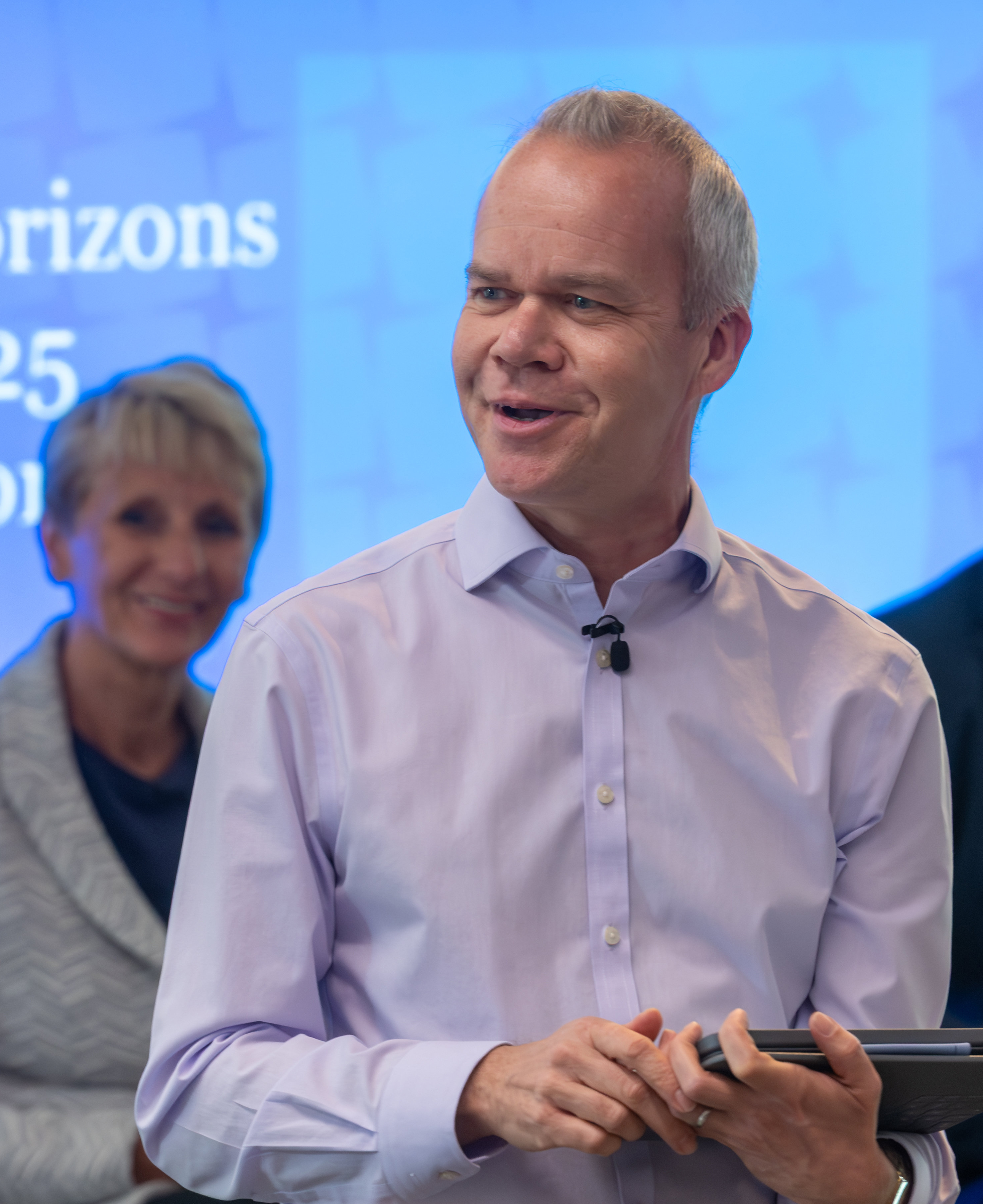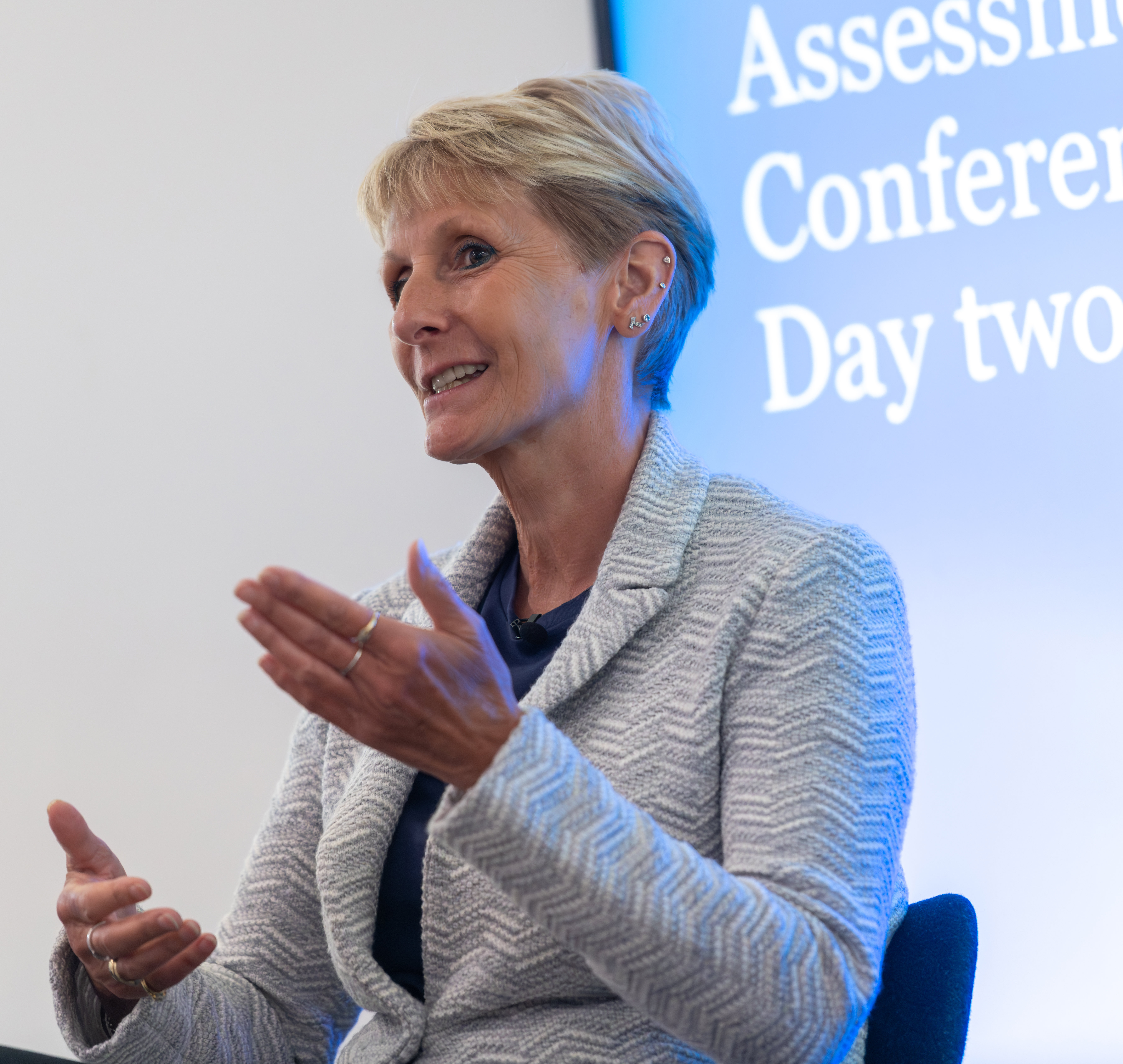At this year’s Assessment Horizons conference, a panel of education experts explored some of the complexities and considerations around authentic assessment (and what it means), future-ready skills, and inclusive, meaningful learning experiences.
The session was chaired by Paul Ellis, Head of Thought Leadership for Education Futures at Cambridge International, who opened with a reflection on Andreas Schleicher’s 2010 call for 21st-century learning, that emphasised the rise of ‘versatilists’:

“He (Andreas) said, the knowledge world is no longer divided between specialists and generalists. He described a new group — ‘versatilists’ — who apply deep skills across a widening range of situations, gaining new competencies, building relationships, and taking on new roles.”
This concept framed the panel’s exploration of how and when assessment can reflect real-world complexity and prepare learners for roles that don’t yet exist. Paul invited the panel members to begin by reflecting on both skills they value in their own work and then to consider the skills they see as important for learners now and in the future.
Skills for educators and learners
James Beadle, Senior Professional Development Manager at The Assessment Network, reflected on the transferable skills he had gained from teaching, especially the ability to tailor communication to diverse audiences. He also spoke about AI tools and why teachers may already have the skillset to use them effectively: “Teachers already have many of the skills needed to use generative AI effectively. It behaves a lot like a student — rarely producing the desired result first time. Teachers instinctively clarify instructions, provide more context, and guide it — essentially, they teach it.”
James highlighted lifelong learning as a key future skill for learners: “Students will likely need to be thinking about what skills they may need in a flexible way throughout their careers and connecting this with developing their metacognitive abilities.”
Dee Arp, Chief Quality Officer at Health and Safety qualifications provider NEBOSH, emphasized the importance of understanding organizational culture, building trust within workplaces and advocating for leadership and inclusive communication: “We need to teach practitioners not just how to deliver a safety management system, but how to understand the culture… and persuade everybody in the organisation that they matter. What we need more now in organisations is trust and for people to understand that every single person has a voice. Everybody's included, everybody matters. That true equity is about empowering everybody to be their best self.”
Dee also felt that awareness of wellbeing for self and others will be an important skill for the future: “With rapid change and rising anxiety — from job insecurity to AI disruption — wellbeing is becoming a critical skill. People need tools to care for themselves and support each other.”
Rebecca Dowbiggin, Education Consultant, Tutor and Academic Supervisor at The University of Cambridge, emphasised collaboration across cultures and adaptability to new technologies as essential skills in today’s educational landscape: “Of course, collaboration isn't new, but the way we collaborate has changed. I often work with schools and students across different countries, and that requires me to adapt to a range of communication styles and technologies. So, being able to engage effectively with people in unfamiliar contexts, using a variety of digital platforms, has become an essential part of my professional practice.”
Reflecting on the fractured media landscape – made more complex by mainstream use of AI tools, Rebecca felt that information literacy was a key skill for future learners: “Teaching ourselves and our students to be more information literate is so important. Relying on a single piece of information or source has never been good practice, but with AI, the need to question, cross-check, and support information with credible evidence is critical. I think that’s going to be one of the major challenges we face.”
What do we mean by ‘authentic assessment’?
Simon Child, Head of Assessment Training at the Assessment Network, defined authentic assessment as “being likely to meet the following criteria (inspired by Ajjawi, R. et al. (2019):
- Alignment with tasks likely to appear outside the programme (e.g. real-world contexts)
- Targeting key knowledge, skills and understanding
- Involving complex problem solving
- Having positive washback effects (e.g. developing meta-cognition in learners and offering more meaningful learning experiences)
- A focus on ‘21st century skills’ such as collaboration
During the panel discussion, Rebecca explained that authenticity is also context dependent and evolves over time. She used the example of how satellite navigation systems are now allowed as part of a driving test to illustrate this point: “Authenticity is not a fixed concept; it’s fluid and context-dependent. What we perceive as authentic today may not be considered so tomorrow.”
James spoke about high-stakes industries like aviation and medicine, which have long used ‘authentic’ assessment types. These are often expensive, and in Higher Education, cost has been a barrier to greater use. He suggested that AI models could offer solutions: “One of the interesting studies I read was using AI for anesthesiologist training - in terms of talking a patient through the procedure and the kind of questions a patient might ask. I don't think you would ever want to use those kinds of models to replace having humans, but it allows you to do these assessments more often, more frequently and allow learners to have more experience of them as well as having these genuine ones as well.”
Similarly, authentic assessment is crucial in the world of health and safety qualifications. Dee reflected that malpractice in these high-stakes industries can be dangerous, especially if learners attempt to ‘fast track’ their assessment without gaining deep learning. For her, authenticity is a partnership between the test taker and the organisation setting the qualification: “Authenticity means ensuring the learner has truly earned the qualification… not just bypassed the learning to get the certificate.”
Key considerations around authentic assessments
The panel explored these considerations further in their breakout sessions. Dee shared how NEBOSH transitioned to online open-book, scenario-based assessments during the pandemic, describing the move as a win for validity: “We can give a really realistic scenario. We're able to drill down on what the learners know, and they can show us that they can apply the theory that they've been learning to the scenario. We can put problem solving questions in there, we can show the critical thinking that they can follow it through that they've seen where the hazards are in that scenario. They're able to assess the level of risk. They're able to prioritise the controls relevant to the scenario. They're able to think through the legal aspects in that scenario. They're able to think through how they need to prepare people in the organisation to roll the controls out.”

To address the challenge of malpractice, NEBOSH introduced a ‘closing interview’: “So an additional check on the authenticity doesn't contribute to the assessment or the qualification, but what we've asked our learning partners to do on completion of the open book examination, they then independently carry out the closing interview.”
Rebecca shared insights from her experience at drama school and as a tutor of students at key stages 5 and 6: “The arts provide a really strong example of that balance where theoretical understanding and practical application are nurtured together in both teaching and learning and assessments.”
“Assessments that engage students with genuine or simulated real world problems, we know that they can deepen learning and they can also uphold academic integrity. They can minimise the incentive for misconduct by making responses uniquely tied to the learner's own experience.”
“I do think it's crucial that we don't lose sight of essential educational values. I don't think it should be about relying solely on EdTech to personalise. I think it's about ensuring that educationally assessment literate educators lead the way - educators who understand the nuances of assessment and broader goals of education.”

James cautioned against devaluing knowledge in the shift toward more skills-based assessments: “There still needs to be knowledge that students have that they can then build on. It's important that we don't devalue that and we don't devalue that to students and say ‘the only knowledge that has value is when you can apply it’.”
James also raised the issue of inclusion: “There is a risk that what is authentic for one student is not authentic for another student. You may be applying something in a context that they're not familiar with or something they have no interest in. If you design a class project that's over something like building a rollercoaster, if a student in that class has never had the opportunity to go to a theme park, potentially that's an alienating experience for them and doesn't seem authentic at all.”
Rebecca concluded the conversation with a reminder that we should always bring any decisions back to the purposes of assessment: “We’ve got to ask what skills would we like these people to have as they have worked towards this assessment? For example, with a situational judgment test, I ask myself: how do I want my students to respond in that kind of situation? What am I aiming to teach them through the process? And how can both the assessment itself and the preparation for it contribute meaningfully to that learning?”
Members of The Assessment Network at Cambridge get free online access to Assessment Horizons and a range of benefits.
Learn more
Illustration: Rebecca Osborne